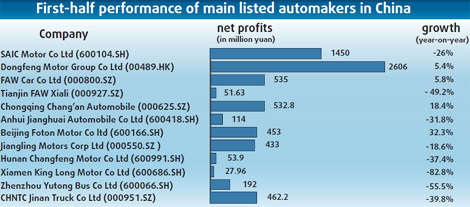
|
BIZCHINA> Top Biz News
 |
|
Domestic carmakers racing toward IPOs
By Timothy Dunne (China Daily)
Updated: 2009-09-07 08:07
China's domestic automakers are going head-to-head with foreign brands to win new customers and increase market share. Today cars such as BYD, Chery and Geely help Chinese brands account for nearly one-third of annual passenger vehicle sales in China. While the contest to win more sales plays out in a very public forum - at the more than 7,000 car dealerships splashed across China - another competition is heating up beyond the gaze of the average Chinese consumer. In a behind-the-scenes race, many Chinese automakers are planning to take - or have already taken - their companies public by listing them on the Shanghai, Shenzhen or Hong Kong stock exchanges. By JD Power and Associates count, 12 of China's top 20 domestic automaker groups including subsidiaries have already organized initial public offerings (IPOs), most of them in the past three to five years. In addition, another four are considering an IPO, according to published reports in the Chinese media. Several major factors are motivating the recent drive to raise capital via the stocks markets. The first, of course, is business opportunity.
While the size of the Chinese market is substantial, the number of private vehicles on the road today is still relatively small compared to the population. China has roughly 34 vehicles per 1,000 people while developed nations such as Germany, Japan and France, each have about 575 vehicles for every 1,000 people. The difference between China and the United States is even more pronounced - the US, which has the highest vehicle density of any country in the world, has 820 vehicles per 1,000 people. Indeed, while passenger vehicle sales will exceed 7 million units this year, that number is expected to increase significantly in the future. JD Power forecasts that Chinese consumers will be buying more than 11.4 million vehicles annually by 2015, a number that should continue to gradually increase over time. So there is plenty of room for growth in the automotive sector, as millions more Chinese consumers enter the middle class and look to achieve that unique combination of freedom of movement and personal expression that vehicle ownership provides. A second major reason for Chinese companies to approach capital markets for funding is competition. While the number of car buyers in China already is large and expected to grow considerably, there is also an expanding group of vehicle manufacturers vying for a share. According to JD Power's count, there are more than 90 local and foreign brands competing in China's passenger vehicle market - more than in any other market in the world - and these brands provide a broad array more than 400 different models for sale. The success of any automotive manufacturer depends greatly on its ability to deliver high quality and attractive products to market. And in the automotive arena - perhaps more so than for any other industry providing products for personal consumption - the stakes are extremely high, due to the high price of developing new products.
Moreover, the cost to create a high-volume compact car can quickly rise to as much as $1 billion if development of an all-new engine or automatic transmission is involved. Admittedly, while product development costs may be less expensive in China, costs would still be substantial, certainly in the range of tens or hundreds of millions of dollars per new model. With these kinds of capital costs involved, automakers cannot afford to miss the mark when developing new products. This is especially true for new Chinese automakers, many of which are less than a decade old, and are competing against international companies with global footprints and considerable experience in developing and selling new vehicles.
A third reason to seek funding from the capital markets is to give Chinese automakers a range of options. It's no secret that some industry observers and academic experts would like to see consolidation among Chinese automakers. This is because they believe that the current proliferation of smaller competitors is detrimental to the automakers that are truly competitive, and that a smaller number of competitors would be preferable for the long-term viability of the domestic auto industry. Chinese companies able to raise capital now would likely be better positioned to develop new products, acquire competitors, stave off potential unwanted suitors - or attract desirable suitors - and expand their distribution networks, either in China or internationally. In short, an IPO can give a good company the financial leverage it needs to guarantee long-term survival. What effect will China's automotive IPO binge have in the marketplace? As in any competition, there will be winners and losers, so ultimately we should see some Chinese brands either merged with a competitor or folded altogether. This may not occur immediately, but over a longer period of time, as current growth projections in the market gives everyone a chance to succeed. Internally, companies seeking to go public will likely experience management and cultural changes, as public companies typically operate under a higher level of scrutiny and accountability, and demands for immediate growth and profits by shareholders are intensified. So for companies that manage a successful IPO, we could see even more ambitious plans going forward. As for the Chinese consumer and China's automotive market as a whole, the impact of these IPOs should produce tangible benefits: More appealing products, higher quality, more choices for consumers, and a healthier, more competitive domestic auto industry. Timothy Dunne is director of Asia Pacific Market Intelligence for JD Power and Associates.
 (For more biz stories, please visit Industries)
|
||||||||